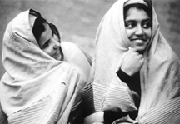
Afghanistan, the Lost Truth 2003
Distributed by Women Make Movies, 462 Broadway, New York, NY 10013; 212-925-0606
Produced by Yassamin Maleknasr
Directed by Yassamin Maleknasr
VHS, color, 64 min.
College - Adult
Anthropology, Middle Eastern Studies, Women's Studies, Asian Studies
Date Entered: 10/18/2004
Reviewed by Charles Burkart, Head, Audiovisual Library, West Virginia University, Morgantown, WVShortly after the fall of the Taliban regime, Iranian film maker, Yassamin Maleknasr, entered Afghanistan with a small documentary film crew. Afghanistan, The Lost Truth is the resulting film. Afghanistan, The Lost Truth, is part travelogue, part road movie, and part anthropological documentary. The director’s Iranian background opened many doors previously closed to western journalists. Her unique journey took her across the vast landscape of Afghanistan from Herat to Kandahar, Kabul, Mazar e Sharif, and Bamian.
Interviews with Afghan people from all walks of life, including women, students, media and cultural leaders (Siddiq Barmak director of Osama) underscore the medieval savagery and cultural repression of the former Taliban regime. Women talk frankly about Taliban repression, current conditions in Afghanistan, and their hopes for a better life. Afghan women suffered most under the fanatical Taliban regime. For instance, when the Taliban closed all schools for girls, many women lost critical years of education Moreover, Afghan television, theater and cinema were brutally repressed, and the entire Kabul film library of 2500 films was publicly burned in a former soccer stadium. Despite this horrible repression, nearly all interviewees evinced guarded optimism about the future of Afghanistan.
Film editing is very subtle and low key in Afghanistan, The Lost Truth. In many cases, one had to be alert to quick scene transitions. Color was clear and the lighting was also excellent. Subtitles were always easy to read. Music played an important part in the film’s development. Regretfully, the lyrics of the many authentic folk songs were not translated into English. The wonderful old musician, Rahim Takhari, appeared in several locations playing different instruments throughout the film. His playing and singing are a total delight.
Sometimes, videos like Afghanistan, The Lost Truth can become quickly dated. However, this film freezes a unique moment in history - Afghanistan after the fall of the fanatical Taliban regime. The thoughtful perspective of Yassamin Maleknasr makes this film a unique and valuable addition to college and university women’s studies, anthropology, and world history collections. Highly recommended.